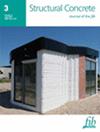Revealing fundamental flexural behavior of reinforced concrete slabs using distributed fiber optic sensors
IF 3
3区 工程技术
Q2 CONSTRUCTION & BUILDING TECHNOLOGY
引用次数: 0
Abstract
Distributed fiber optic sensors (DFOS) allow for the measurement of distributed strains on concrete surfaces and along steel reinforcement in reinforced concrete (RC) members, and these measurements can quantify reinforcement and concrete behavior. In this investigation, concrete surface and reinforcement strains from DFOS were used to quantify and compare the structural behavior of lightly and moderately reinforced one‐way slabs strips to better characterize localized strain behavior of lightly reinforced RC members with small diameter bars (10 M). By quantifying the entire compression region and reinforcement strain behavior, various structural parameters, such as curvature, strain profiles over the height at various locations, and neutral axis depth were calculated. From the distributed properties, it was determined that significant differences in behavior existed between moderately and lightly reinforced specimens with small diameter bars, with the lightly reinforced specimen displaying non‐uniform behavior along its length. Differences observed in the lightly reinforced member with small diameter bars include local curvature differences both at a crack and between cracks, local evidence of plane sections not remaining plane, possible different internal cracking mechanisms, amongst other local strain behavior differences, which could have implications for future modeling and design of lightly reinforced RC members with small diameter bars.利用分布式光纤传感器揭示钢筋混凝土板的基本抗弯行为
分布式光纤传感器(DFOS)可以测量钢筋混凝土(RC)构件中混凝土表面和钢筋上的分布应变,这些测量结果可以量化钢筋和混凝土的行为。在这项研究中,利用 DFOS 测量的混凝土表面和钢筋应变来量化和比较轻度和中度加固单向板带的结构行为,以更好地描述使用小直径钢筋(10 M)的轻度加固 RC 构件的局部应变行为。通过量化整个压缩区域和钢筋应变行为,计算出了各种结构参数,如曲率、不同位置高度上的应变曲线和中性轴深度。从分布特性中可以确定,使用小直径钢筋的中度加固和轻度加固试样之间存在显著的行为差异,轻度加固试样沿其长度方向显示出不均匀的行为。在使用小直径钢筋的轻加固构件中观察到的差异包括裂缝处和裂缝间的局部曲率差异、平面截面不保持平面的局部证据、可能不同的内部开裂机制以及其他局部应变行为差异,这些差异可能会对未来使用小直径钢筋的轻加固 RC 构件的建模和设计产生影响。
本文章由计算机程序翻译,如有差异,请以英文原文为准。
求助全文
约1分钟内获得全文
求助全文
来源期刊

Structural Concrete
CONSTRUCTION & BUILDING TECHNOLOGY-ENGINEERING, CIVIL
CiteScore
5.60
自引率
15.60%
发文量
284
审稿时长
3 months
期刊介绍:
Structural Concrete, the official journal of the fib, provides conceptual and procedural guidance in the field of concrete construction, and features peer-reviewed papers, keynote research and industry news covering all aspects of the design, construction, performance in service and demolition of concrete structures.
Main topics:
design, construction, performance in service, conservation (assessment, maintenance, strengthening) and demolition of concrete structures
research about the behaviour of concrete structures
development of design methods
fib Model Code
sustainability of concrete structures.
 求助内容:
求助内容: 应助结果提醒方式:
应助结果提醒方式:


